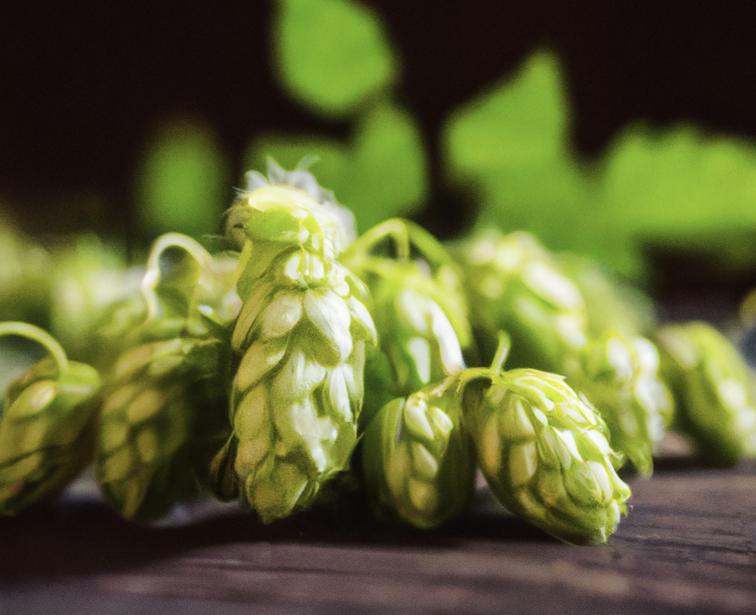What do tannins in beer taste like? Tannins are a group of naturally occurring compounds found in plants, seeds, bark, wood, and fruit skins that can impart astringent and bitter flavors to beer.
In this blog post, we’ll explore the taste of tannins in beer, their sources, how they affect the brewing process, and how to manage tannin levels in your homebrew.
We’ll also discuss common misconceptions about tannins and their role in beer clarity and stability. So, let’s dive in and learn more about these fascinating compounds.
The Taste of Tannins
Tannins are often described as having a dry, puckering, and astringent taste. They can also contribute a slight bitterness to beer, although this is more commonly associated with hop-derived compounds.

The astringency of tannins is caused by their ability to bind with proteins in your saliva, causing the proteins to precipitate and leaving behind a dry, rough feeling in your mouth.
However, not all tannins taste the same or have the same intensity of astringency. The taste of tannins can be influenced by factors such as their concentration, molecular size, and the presence of other flavor compounds in the beer.
Sources of Tannins in Beer
Tannins can come from various sources during the brewing process. Some of the most common sources of tannins in beer include:
Malted Grains
The primary source of tannins in beer is malted grains, particularly the husks of barley and other cereal grains. The outer layers of these grains contain a relatively high concentration of tannins, which can be extracted during the mashing process. The amount of tannins extracted from the grains can be influenced by factors such as the type of grain, the degree of milling, and the mashing conditions (temperature, pH, and time).
Hops
Although hops are primarily used to provide bitterness and aroma in beer, they also contain a small amount of tannins. The tannins in hops tend to be less astringent than those found in grains and can contribute to a more rounded and complex bitterness.

Oak Aging
Some beers are aged in oak barrels, which can contribute additional tannins to the finished beer. These tannins can provide a smoother, more rounded astringency and can also contribute flavors such as vanilla, spice, and toast.
Tannins and the Brewing Process
Tannins can have both beneficial and detrimental effects on the brewing process and the final beer. Some of the key roles of tannins in brewing include:
Beer Clarity
Tannins can contribute to beer haze by binding with proteins and other haze-forming compounds. However, they can also promote beer clarity by causing these haze-forming compounds to precipitate out of the beer during fermentation, aging, or chilling.
Beer Stability
Tannins can improve beer stability by binding with oxygen and other reactive compounds, reducing the potential for oxidative spoilage. They can also help to stabilize foam by binding with proteins and increasing their surface activity.
Mouthfeel and Flavor
Tannins can contribute to the mouthfeel of beer by providing astringency and a perception of dryness. They can also enhance the overall flavor profile by adding complexity and depth to the beer’s bitterness and other flavors.

Managing Tannin Levels in Homebrewing
As a homebrewer, it’s essential to control tannin levels in your beer to achieve the desired balance of flavors and mouthfeel. Some tips for managing tannin levels in homebrewing include:
Mash Temperature and pH
Maintaining the proper mash temperature and pH can help to minimize tannin extraction from the grains. A mash pH of 5.2 to 5.6 and a mash temperature of 148-158°F (64-70°C) are generally recommended to reduce tannin extraction.
Sparge Temperature and pH
During the sparge, using water that is too hot or has a high pH can lead to excessive tannin extraction. Aim for a sparge water temperature of 170°F (77°C) or lower and a pH of 5.5 to 6.
Grain Milling
Adjusting your grain mill to produce a coarser crush can help to reduce tannin extraction by minimizing the amount of husk material that is exposed during mashing.
Hopping Rates
Using a lower hopping rate can help to reduce the amount of tannins contributed by hops. However, this should be balanced against the desired level of bitterness and hop flavor in the final beer.
Common Misconceptions About Tannins in Beer
There are several misconceptions about tannins in beer that are worth addressing:
– All tannins are bad: While excessive levels of tannins can be detrimental to beer flavor and mouthfeel, moderate levels of tannins can contribute positively to beer complexity, stability, and mouthfeel.
– Tannins cause off-flavors: Tannins themselves do not cause off-flavors in beer. However, they can enhance or suppress the perception of other flavors, which may be perceived as a flaw if not balanced correctly.
– Tannins are only found in dark beers: Tannins can be found in beers of all colors, although they may be more noticeable in darker beers due to the higher concentration of malt-derived compounds.
Conclusion
In summary, tannins are complex and fascinating compounds that can contribute both positively and negatively to beer flavor, mouthfeel, and stability. By understanding the taste of tannins, their sources, and their role in the brewing process, homebrewers can better manage tannin levels in their beer and achieve the desired balance of flavors and mouthfeel. Here are ten key facts about tannins in beer:
1. Tannins contribute a dry, astringent taste to beer.
2. The taste of tannins can vary depending on their concentration and molecular size.
3. Malted grains are the primary source of tannins in beer.
4. Hops and oak aging can also contribute tannins to beer.
5. Tannins can impact beer clarity, stability, mouthfeel, and flavor.
6. Not all tannins are bad for beer – moderate levels can provide complexity and depth.
7. Managing mash and sparge conditions can help to minimize tannin extraction in homebrewing.
8. Tannins can be found in beers of all colors, not just dark beers.
9. Tannins can enhance or suppress the perception of other flavors in beer.
10. Understanding tannins can help homebrewers achieve the desired balance of flavors and mouthfeel in their beer.
FAQs
What causes tannin in beer?
Tannins in beer can be caused by various factors, including the use of certain grains, such as barley or wheat, during the brewing process. Additionally, the presence of tannins can result from the use of certain hop varieties or from extended contact with plant material during brewing. Tannins can contribute to astringency and bitterness in beer, affecting its overall flavor profile.
Are sour beers better for your gut?
Sour beers can potentially have some benefits for gut health due to their probiotic content. The presence of certain beneficial bacteria in sour beers, such as lactobacillus and pediococcus, can help promote a healthy gut microbiome. However, it’s important to note that the overall impact on gut health may vary depending on various factors, including individual tolerance, consumption quantity, and the specific beer. Moderation and a well-balanced diet remain key for maintaining a healthy gut.
What is tannin in brewing?
Tannin in brewing refers to a group of organic compounds found in various plant materials, such as grains, fruits, and hops. It is responsible for contributing astringency and bitterness to the final beer. Tannins can be extracted during the brewing process, particularly when excessive temperatures or pH levels are present. Controlling tannin extraction is crucial to achieving a balanced and desirable flavor profile in beer.
What are tannins in wort?
Tannins in wort are polyphenolic compounds that can be extracted from the husks of malted grains during the brewing process. They can contribute astringency and harsh flavors to the final beer if present in excessive amounts. Tannins are typically extracted when the pH of the wort is too high or when there is prolonged contact between the grain husks and hot water. Proper pH control and careful handling of the grains during mashing can help minimize tannin extraction and ensure a smoother, more balanced beer.
Are tannins good for beer?
Tannins are typically not desirable in beer as they can contribute harsh and astringent flavors. Excessive tannin extraction during brewing can result in a dry and puckering sensation, negatively impacting the overall taste and mouthfeel of the beer. Brewers aim to minimize tannin extraction to achieve a balanced and enjoyable beer.
Do sour beers have tannins?
Yes, sour beers can contain tannins. Tannins are naturally occurring compounds found in various fruits, such as grapes, apples, and cherries, which are commonly used in the production of sour beers. These tannins contribute to the beer’s mouthfeel, astringency, and overall flavor profile.




